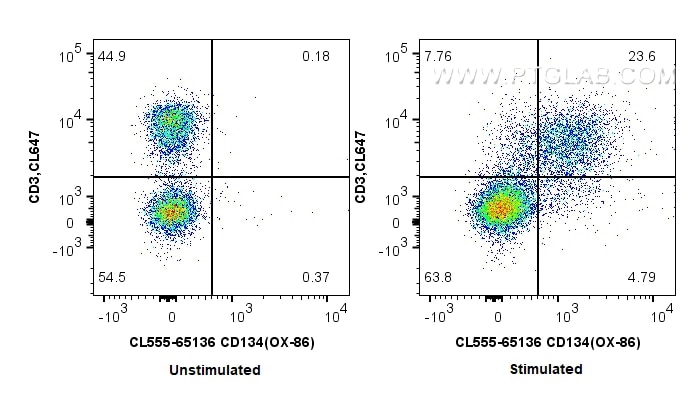CD134/OX40 Monoklonaler Antikörper
CD134/OX40 Monoklonal Antikörper für FC
Wirt / Isotyp
Ratte / IgG1, kappa
Getestete Reaktivität
Maus
Anwendung
FC
Konjugation
CoraLite® Plus 555 Fluorescent Dye
CloneNo.
OX-86
Kat-Nr. : CL555-65136
Synonyme
Geprüfte Anwendungen
| Erfolgreiche Detektion in FC | Anti-CD3/CD28 treated mouse splenocytes |
Empfohlene Verdünnung
| Anwendung | Verdünnung |
|---|---|
| This reagent has been tested for flow cytometric analysis. It is recommended that this reagent should be titrated in each testing system to obtain optimal results. | |
| Sample-dependent, check data in validation data gallery | |
Produktinformation
CL555-65136 bindet in FC CD134/OX40 und zeigt Reaktivität mit Maus
| Getestete Reaktivität | Maus |
| Wirt / Isotyp | Ratte / IgG1, kappa |
| Klonalität | Monoklonal |
| Typ | Antikörper |
| Immunogen | k.A. |
| Vollständiger Name | tumor necrosis factor receptor superfamily, member 4 |
| GenBank-Zugangsnummer | BC065782 |
| Gene symbol | CD134 |
| Gene ID (NCBI) | 22163 |
| Konjugation | CoraLite® Plus 555 Fluorescent Dye |
| Excitation/Emission maxima wavelengths | 554 nm / 570 nm |
| Form | Liquid |
| Reinigungsmethode | Affinitätsreinigung |
| Lagerungspuffer | PBS with 0.09% sodium azide |
| Lagerungsbedingungen | Store at 2-8°C. Avoid exposure to light. Stable for one year after shipment. |
Hintergrundinformationen
CD134, also known as OX40 and TNFRSF4, is a member of the TNFR-superfamily of receptors (PMID: 2828930; 9766631). It is a type I transmembrane protein predominantly expressed on activated T cells which include CD4 and CD8 T cells, Th2, Th1, and Th17 cells, as well as regulatory T cells (Tregs) (PMID: 20307208). CD134 is activated by its cognate ligand CD134L (OX40L) and functions as a T cell co-stimulatory molecule (PMID: 26215166). CD134-CD134L interactions have been proposed as a potential therapeutic target for treating autoimmune diseases, cancer and infectious disease (PMID: 26215166; 19426222).
Protokolle
| PRODUKTSPEZIFISCHE PROTOKOLLE | |
|---|---|
| FC protocol for CL Plus 555 CD134/OX40 antibody CL555-65136 | Download protocol |
| STANDARD-PROTOKOLLE | |
|---|---|
| Klicken Sie hier, um unsere Standardprotokolle anzuzeigen |


